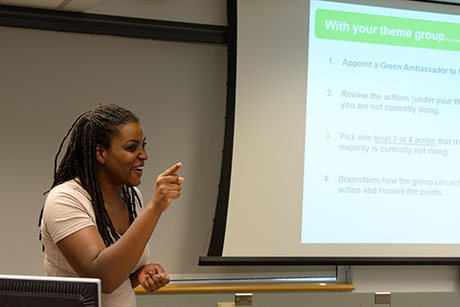Smackdown's upside nets $23,000 in energy savings
By Blaine Friedlander

Striving to become greener than ever, Martha Van Rensselaer Hall West and the residential complex Court-Kay-Bauer and Mews halls won their respective electricity saving contests in the Energy Smackdown, held Nov. 17-Dec. 31. The two competitions have conserved about $23,000 in electric energy costs for Cornell.
The College of Human Ecology pitted its five buildings against each other to save the most energy by closing lab fume hoods when not in use, turning off lights, shutting down computers and other measures.
Martha Van Rensselaer West won the competition by maintaining a 33.2 percent reduction in electrical energy consumption. In total, the college avoided consuming 123,744 kilowatt-hours of electricity and saved about $9,000 in energy costs – the equivalent to running 1,000 60-watt light bulbs for 2,000 hours.
Martha Van Rensselaer East maintained a 28.5 percent electric consumption savings; Beebe Hall, 24.3; Savage Kinzelberg, 9.3; and the Human Ecology Building, 5.2 percent. The Human Ecology Building, which opened in 2011, is certified LEED Platinum and is highly energy efficient.
“We were able to save that amount of energy because our offices participated in the Cornell Green Office Certification Program and promoted energy saving processes like shutting down electronic equipment when not in use, consolidating and sharing equipment in labs and kitchenettes, and rewarding those who participated,” said Jim Hatch, the college’s facilities manager.
“We helped provide occupants the tools to save energy, and then we started to measure it during the Smackdown. … Faculty, students and staff participated with incredible passion,” said Hatch. “They continued to work with me to help change building occupancy schedules, lighting programming and temperature set points.”
The college began its Green Ambassadors and Toward a Sustainable Organization program on Earth Day 2014 and bolstered the effort at the start of the fall semester. About 53 percent of certified green offices at Cornell are housed in Human Ecology, as are one-third of certified green labs.
Karl Pillemer, the Hazel E. Reed Professor in Human Development, leads pilot research that could nudge individuals into composting, carpooling, and turning off lights and computers when not in use.
Meanwhile, Court-Kay-Bauer and Mews residence halls won the Campus Life competition by maintaining a 28 percent reduction in electrical energy consumption. In total, 13 residence halls avoided consuming more than 156,000 kilowatt-hours of electricity and avoided about $14,000 in energy costs.
Imani Allen, resident director of Court-Kay-Bauer, explained that her residents conserved energy by unplugging phone chargers when not in use and relying on natural light during the day.
“The Court-Kay-Bauer Hall Council’s Community Action Board held a program to highlight the Energy Smackdown,” she said. “Overall it was the residents’ individual decision to participate and to support the initiative.”
In other residence hall results, Risley Hall scored a 25.5 percent reduction; Clara Dickson Hall, 19.8; Ecology House, 18.5; and Balch Hall and the Latino Living Center, tied, 16.1.
Real-time electrical energy use was measured through the Cornell Building Dashboard. The College of Human Ecology and Campus Life retain the avoiced energy costs.
Media Contact
Get Cornell news delivered right to your inbox.
Subscribe